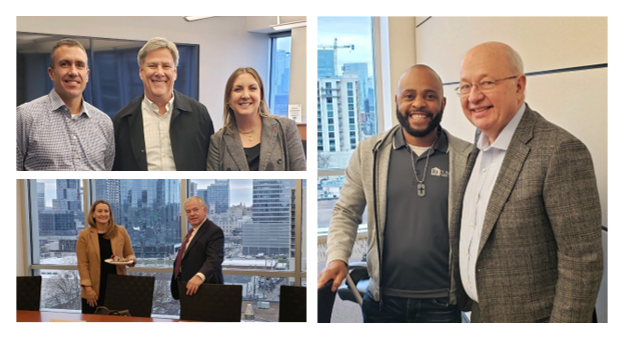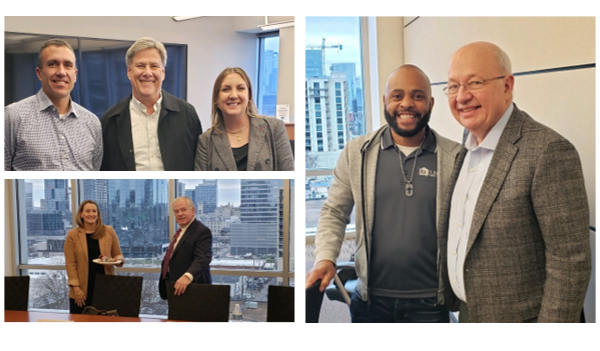Key Take Aways from December 2024 Meeting!
Lee Hunter (CapStar Bank): Lee is with CapStar Bank and he mentioned that CapStar is being bought by Old National Bank of Evansville, Indiana. He feels that the transaction should be complete by April 1, 2024, subject to regulatory approval. His conversations with borrowers and attorneys seem more optimistic because people are going to do deals this year and maybe some next year. He is also hopeful this year will be more positive than last year. Things may be a struggle the first half of the year but will turn the latter part of the year. Also, he feels the impact after the merger will be that they will have the ability to pick and choose deals and actually make money this year.
Kelly Cochran (State of Tennessee Real Estate Asset Management (STREAM)): Kelly is in leasing and leases turnkey office space for 27 state agencies. She is busy and currently readvertising for leases that fell apart when the interest rates increased. Although she represents the agency, she still works for the taxpayers and wants to maintain those relationships. She mentioned if you are a developer and would like to bid on a lease project, the website is www.tnlpr.gov. All the forms are online and if you have any questions, please call her. This is where she will advertise projects. She is currently looking in Perry County and Giles County and will be advertising in Dyer County.
Justin Gallardo (CapStar Bank): Justin works with Lee at CapStar Bank. Since the last meeting, there was a Fed’s meeting and he noticed a bit more optimism. Once every quarter, the Fed’s produce the dot plot, which are all the Fed governors that vote on fed funds and project what it will be in the future. The change from the September 2023 dot plot to the December 2023 dot plot for the end of 2024 was 200 basis points lower. If they move in 25 basis points, that would be 8 cuts from where we are today. The Fed’s like to stay neutral in election years. Some may think they will make the change early in the year so they do not change closer to election time and possibly influence the election. He feels that the 200-basis cut would make a lot of transactions more feasible. The interesting part is when will it happen.
John Agee, P.E. (Terracon): Terracon is a company that does environmental due diligence up front with projects. Work is still steady relative to opportunities and people looking for transactions with ESAs, due diligence, geotechnical work, design level. He is noticing that a number of projects that had hit the pause button last year are re-engaging to move forward. He has some clients that are certainly optimistic. When interest rates go up, the private money gets tight and then the federal and state and municipal type funds and activity picks up and currently he is still seeing that happen too. He is still seeing a lot of work with the Corps of Engineers, TVA and military construction. He also mentioned that a lot of emphasis is on the infrastructure.
Jim Murphy (Bradley Arant Boult Cummings): Jim is a partner at Bradley. He has been really busy the last two months, but it is with a project that has some government funding involved and he believes that is why it is moving forward. Many of his other clients that don’t have government funding are slowing down, particularly in the multiple family space. It is encouraging to hear that maybe rates will turn in the right direction. He said some have said that Nashville will not suffer as much as other places and since he still has work going on, he hopes that continues.
Mia Keller (The Pizzuti Companies): The Pizzuti Companies is a development company. She believes the ground up development of industrial is going to come back first for them before multi-family. She has seen this indication based on some of their institutional investors where they are more open to doing some ground up industrial. She also noticed that life insurance companies, who typically don’t lend on construction, have opened up to fill the gap. On the positive side for multi-family development, the average rent in Nashville now is $2165. Another positive side of multi-family, Nashvillians must earn at least $124,000 a year to afford a median priced home. They are bullish on the tier 1 suburbs for multi-family. They will break ground this year on Donaldson Bowl 155-unit project, probably mid-year.
Kevin Eakes (Bohler Engineering): Bohler is a land development company that offer civil engineering, surveying services. They are mostly on the east coast, but opened their office in Nashville in April 2023. He is seeing that industrial is still doing well. Single-family residential still seems to be doing well. Multi-family is a little light right now. He is still getting requests to look at small site commercial retail. He is excited and looking forward to 2024.
Stephen Brink (First Southern Mortgage Corp): Stephen said that he doesn’t see a reason for the Fed’s to reduce interest rates a lot because the unemployment rate is still at record lows and although there has been a slowdown in new development, it hasn’t come to a stop. On the permanent loan side, life insurance company lenders still have plenty of money to lend and there is no pullback on what their demand is. They are lending at approximately 5.5% – 6.5%. He feels that the permanent lenders may soften their underwriting requirements because they are not getting as much money invested in the market. Multi-family and industrial are still the favorites, followed by retail and then offices.
Steve Preston (CBRE): Steve focus primarily in the industrial space but his group play in a lot of different buckets. For instance, there are things called industrial that are different like industrial outside storage. This is where you have a big yard and nothing but trailers, but it is outside with no roof. They look for land for big box developers. He is seeing most of their activity in the smaller multi-tenant rear load building. He said that Nashville is strategically located. According to FedEx, a retailer can reach 72% of the country by 2-day ground service. Beverage companies are coming to Nashville. Steve said that for the first time, he is seeing organic growth in Nashville this quarter. People are not coming into Nashville; they are here and they are growing.
Richard Warren (Bradley Arant): Richard feels that Nashville is a great place and it is where people want to be and they keep coming here. He feels that the development is all over and not concentrated in a few places. He is excited at all the growth in Nashville.
Paul Gaither (CBRE): Paul is the practice leader for retail in Middle Tennessee and has been with CBRE for 25 years. He mentioned that Tom Trent said to him one time that Nashville continues to win the war on talent and as long as that is the case you know our economy is going to thrive. He feels that retail is an asset class where everyone should want to be. Currently, vacancies are at 4% and lower than that in Nashville. His challenge is that retail is expensive to build and difficult to make the numbers work as a result of this, tenants are in a scarcity mentality. From an investment perspective, you would want to own retail because you’ll get a higher yield, cash flow derives from long-term leases, eCommerce goes up when you open a brick and mortar – it goes down when you close a brick and mortar. He feels retail is sexy.
Jim Hellier (City of Spring Hill): Jim is the Economic Engagement Manager in Spring Hill and decided to come to Middle Tennessee because it is one of the healthiest environments in the country. His job is to strengthen the quality of life in Spring Hill by getting more people to come to Middle Tennessee but also work in Spring Hill. He is working with small to mid-sized business owners that are trying to figure out how to expand. Spring Hill is trying to figure out how to expand their infrastructure. TDOT just granted Route 31 escalation that they will not only start, but finish. Things are happening and moving forward. He has a data analytic tool that he will be using to work with people that are coming to the area. It will have more knowledge and data on why they should move to Spring Hill, what the quality of life will be like, where should they be in the city, etc. He is trying to build visibility for retail that will share store fronts. He would like to build relationships with developers.
Jeff Thomas (Charles Hawkins Co.): Mr. Hawkins started his company in 1962 where he only wanted to be in Davidson County. About 8-10 years ago, the Hawkins firm has grown and is involved heavily in Portland and down the 65 South, Alabama corridor. They are 75% on the industrial side. His first sales meeting and people had a lot of optimism. One of his longtime mentors, Richard Fulton, said that Nashville will be okay. He is seeing a lot of activity picking back up. The smaller bootstrappers are really doing well right now and they are taking over and doing a lot of leases under 5k sq. ft. He is optimistic about the continued growth and it is not anywhere near being done.
Janet Miller (Colliers): Janet runs the Colliers International office in Nashville. Her three themes are (i) yes, we can screw up the city, (ii) what is the shape of the recovery curve going to be, and (iii) banker point of view. About six months ago she rolled on the board for Studio Bank and it has been deeply educational for her. She has learned that she runs a margin business where a 20% margin will give you leeway to still thrive. If you are running a bank you are talking about 2% – 4% margins if you are doing well. She just learned that banks must be impeccable in underwriting. The shape of the recovery curve will be a steep ascent because of the investment demand. Retail is sexy as hell as an investment and you cannot find enough sites that meet the qualifications. It was an extraordinary year for retail. Self-storage is sexy because it is a metal building with a roll up door, but it is cash flow. We can screw this up because we must get the transit and infrastructure issues figured out. Nashville is one of the last cities that does not have it together.
Graham Gilreath (First Southern Mortgage Corp): Graham will focus on construction loans. Unfortunately, because banks have pulled back and not lending as much, life companies have stepped up but there is a big sector in private credit otherwise known as debt funds that has just exploded. Over the past 5 to 10 years, it has become a more mature asset class of sophisticated investors. The fund raising has gone through roof. In the past, you would be a bit scared of borrowing from that type of lender, today they are being backed by big sophisticated capital. It is expensive capital. Many of these groups have former developers on staff and if you cannot pay, they will take the property back and finish developing it.
Other investors who may not have made a loan, looks at JP Morgan as a sophisticated lender and say if they can be here, they can too. They can take the perceived risk as well. He is seeing deals made with a lot of foreign funds, with a completion guarantee.
Eric Spencer (GBT Realty Corporation): GBT Realty is a 37-year-old company that has always been based here in Nashville. The Tomlin family started at 1987 in Brentwood, Tennessee. Most of GBT’s history is in the retail space. They have diversified into many different things, including office buildings and multi-family. GBT is doubling down on retail for the next couple of years as he sees that as their primary vehicle for most of their development investments. They have an advantage of long-time relationships. He is looking for people who have retail to sell. He feels that the fundamentals are solid, threats are not over but they are much more limited than what the majority of the investing world really thought. Land banking, especially in Nashville, is worth it as it will come back quickly.
Devin McClendon (NAI Nashville): He oversees NAI Nashville’s brokerage, property management and then small-scale development management for existing clients. He was surprised to find out that the Nashville market has added 7 million square feet of office since 2020. Comparatively that is slightly below the Brentwood/Maryland Farms submarket, which is 8.2 million square feet. The high mark for occupancy rates was back in 2016. The vacancy rates are not as sad as they are in most other places. Nationally there is about an 18%-19% vacancy. As a local market, all of Middle Tennessee, Davidson and suburban counties, are at about 14.5% vacancy. They are struggling because there is a flight to quality. He feels that Class AA+ will fill. Maryland Farms have the highest aged Class B buildings. He did want to know if we would get an airport in Spring Hill.
Dan Rogers (First Bank of the Lake): He is working with the construction owner, insurance company, the retail build out. They are a big player nationally, not yet in Tennessee. Their average loan size is under $1 million and they did over 400 loans last year. They use your existing equity in your current building to build your next building. Low equity. They want business growth. They are a transactional lender. He moved to Nashville from Sacramento about two years ago and says it is a pain to get to Nashville. Transit is a definite need. Tennessee, unfortunately, is at the bottom spectrum list when it comes to SBA loans per capita per business owner who can actually work. His boss is telling him to go find more loans.
Bill Joy (Mortgage Capital Investments): Mortgage Capital Investments’ money comes primarily from life insurance and every life insurance company have a different way of looking at things. He said that treasuries did come down but that is because China is buying up our treasuries. People may not realize that the currency is based on their gross domestic product and when their gross domestic product is down, they shore up their currency by either buying gold or buying bonds of a country that is stable. If you check it, on the last auction, the Chinese were one of the biggest buyers. The proof of this is that SOFR didn’t move. The wall of maturity is coming up in commercial real estate and the next two years will be difficult.
Trey Linton (W.E. O’Neil Construction Co.): W.E O’Neil has been in the market for about 10 years and is a notable firm throughout the nation but is looking to establish a strong foothold in Nashville. Trey is in the Special Project Division that includes light industrial. Over the past year they have been pursuing a lot of state work and is finishing up a project with TDOT. University and educational work is still going steady. It has been a good market for them this past year. Construction has a huge supply and demand issue in the Nashville market. He feels that it is important as developers and owners when you are vetting out general contractors, also get facetime with the subcontractors and see what other projects they are doing in the market as well. Trey has seen many subcontractors go belly up over the past couple of years because they took on as much as they could get and spread themselves too thin. Overall W.E. O’Neil is very optimistic of the Nashville market.






Recent Comments